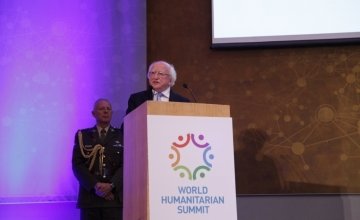
Read our 2024 annual report

Knowledge Hub
The future of aid: six lessons from the Irish Humanitarian Summit

An important moment for the global community to define what humane, effective and responsible humanitarian action looks like has come. Find out what leaders in the field think the future of aid should look like.
On 2 July 2015 the first ever Irish Humanitarian Summit was held in the O’Reilly Hall, UCD. Attended by over 230 leaders and representatives of the Irish humanitarian community, the Summit was an opportunity to shape our national recommendations for the World Humanitarian Summit next May.
The World Humanitarian Summit will be a pivotal moment when the global community comes together to commit to working together saving lives and reducing hardship.
It has been almost 25 years since the last discussion around humanitarian action of this magnitude took place. The world that we live in has, in some ways, become unrecognisable since then. New technology and innovations mean that the way we work to address poverty and inequality has changed.
But the number of people affected by disaster and conflict has drastically increased, and the safety of humanitarian workers is increasingly compromised. Climate change and population growth are other challenges that underline the importance of an international commitment to coordinated action.
With a hall packed with experienced aid workers and policy-makers, a breadth of strong opinions and proposals were voiced throughout the day. Here are some of the most significant themes that emerged.
Bold and tangible proposals
President Michael D. Higgins opened the day with an impassioned keynote speech that covered not only the cultural roots of Irish humanitarian aid, but our collective responsibility to commit to our future as global citizens in innovative ways.
Putting women at the centre
This statement from Rosamond Bennett, Christian Aid Ireland, encapsulates much of the discussion of themes of protection and prevention of gender-based violence.
The Irish humanitarian community believes that gender must be a priority issue during May’s World Humanitarian Summit. Gender-based violence is common in emergency situations – strengthening protection strategies, training humanitarian staff to a high standard, and supporting dialogue around this issue will be critical looking forward.
Disaster risk reduction

Creating capacity to deal with crises before they occur is a difficult, but important task. One of the ways to do this is by engaging with diaspora groups.
After this year’s Nepal earthquake, the Irish humanitarian sector worked with the Non Resident Nepalese Association in its relief efforts. Nabaraj Koirala, its vice-president, observed that “this help was really appreciated… [it was the] fastest way to provide immediate help to families in need.”
Creating and maintaining networks like these, as well as enhancing resilience and setting up early-warning mechanisms in disaster-prone areas were discussed as important strategies.
The private sector and humanitarian response

“We need to create the platform and space where the private sector can come in,” said Concern’s CEO Dominic MacSorley.
“We can learn from them and not just use their resources.”
His sentiments were underlined by Western Union’s Tim Keane: “I feel a greater inclusion of the private sector in the design and implementation of humanitarian programmes would be to the benefit of everyone.”
Inclusion of affected communities
Hans Zomer, Director of Dóchas, noted that “the international aid system has always found it difficult to genuinely listen to and respond to the needs of those affected by disasters”.
This is why putting those hit by disasters at the heart of humanitarian response emerged as a key recommendation from the Summit.
Developing tools and approaches that allow meaningful dialogue with communities affected by crises is crucial, as is reinforcing accountability in disaster contexts.
A future-forward Irish aid policy
Whether in Yemen, South Sudan, the Central African Republic or Syria, Ireland’s recent history regarding the peace process could allow it a unique position in conflict resolution around the world. “There are systems that could be transported to other conflicts around the world,” said Concern’s Anne O’Mahony.
Find out more
Concern implements a huge diversity of programmes, designed to address specific causes of extreme poverty in communities across 25 countries. These programmes are guided by six thematic focus areas.


